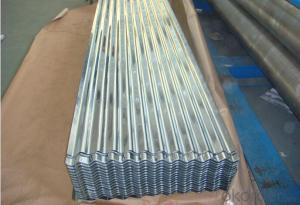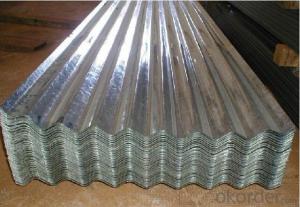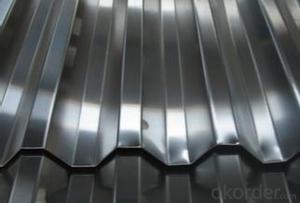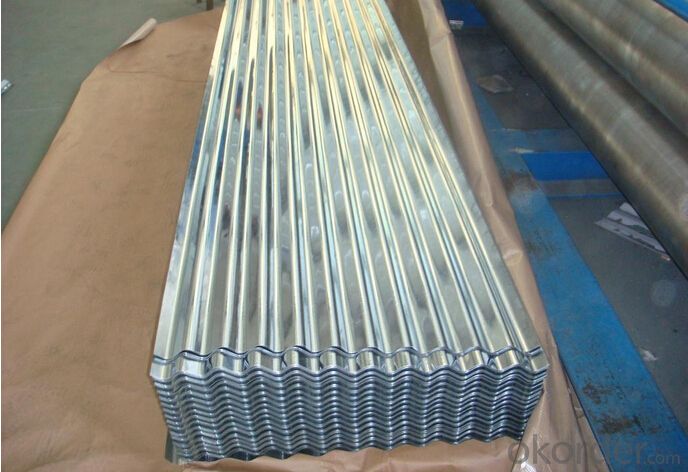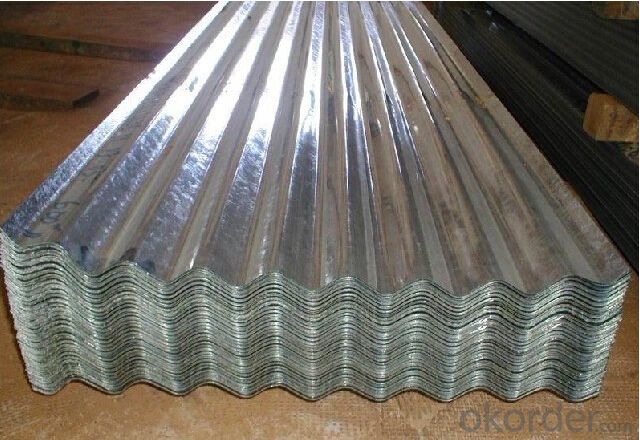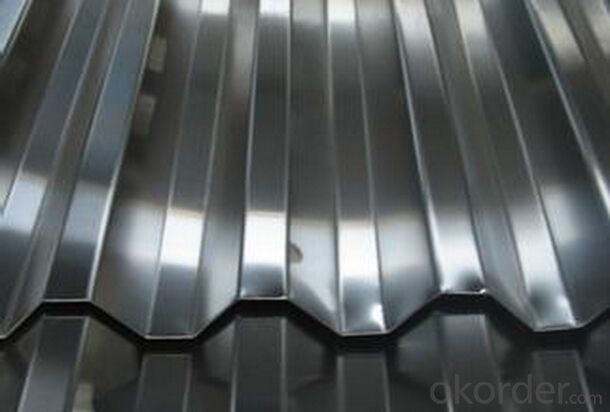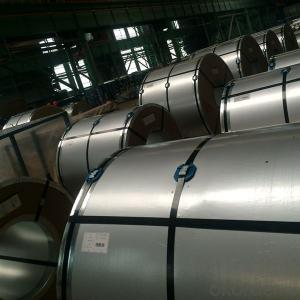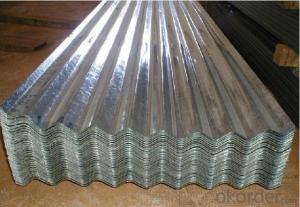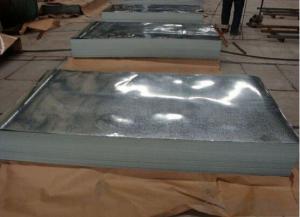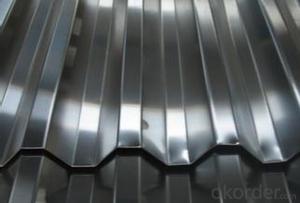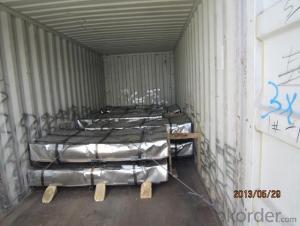Good Quality of Corrugated Galvanized Steel Sheet of China
- Loading Port:
- Tianjin
- Payment Terms:
- TT OR LC
- Min Order Qty:
- 50 m.t.
- Supply Capability:
- 5000 m.t./month
OKorder Service Pledge
OKorder Financial Service
You Might Also Like
1. Hot-Dip Galvanized Steel Roof Description:
Hot-dip galvanized steel roof are available with a pure zinc coating through the hot-dip galvanizing process. It offers the economy, strength and formability of steel combined with the corrosion resistance of zinc. The hot-dip process is the process by which steel gets coated in layers of zinc to protect against rust. It is especially useful for countless outdoor and industrial application.
2.Main Features of the Hot-Dip Galvanized Steel Roof:
• Excellent process capability
• Smooth and flat surface
• Workability, durability
• Excellent heat resistance performance
• High strength
• Good formability
• Good visual effect
3.Hot-Dip Galvanized Steel Roof Images
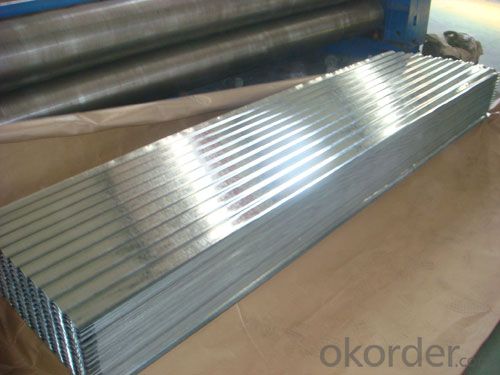
4.Hot-Dip Galvanized Steel Roof Specification
Material: Galvanized Sheet
Width: 650/800/890/900
Length: 1500/1800/2000/2400/3005/3600 or customized
Thickness: 0.2-2.0
Surface Treatment: Hot dipped/Bended
Application: warehouse; shelter; Commercial facilities; industrial facilities
5.FAQ of Hot-Dip Galvanized Steel Roof
Which payment term we can do?
L/C at sight or T/T.
What’s the basic material of this product?
Galvanized/Aluzinc Steel
Arial Unicode MS"'>5.FAQ of Pre-Painted Galvanized/Aluzinc Steel Roof
What’s the brand of the paint?
We use the best brand of all of the word—AKZO.
What’s the wet and heat resistance of the roof?
More than 1000 hours.
- Q: What is a steel coil?
- A steel coil is a long, continuous sheet of steel that has been wound into a coil shape. It is typically made from hot-rolled or cold-rolled steel and is used in various industries for manufacturing purposes, such as in automotive, construction, and appliance sectors.
- Q: What are the quality standards for steel coil manufacturing?
- The quality standards for steel coil manufacturing typically include criteria such as dimensional accuracy, surface finish, mechanical properties, chemical composition, and adherence to industry-specific standards like ASTM or EN. These standards ensure that the steel coils meet the required specifications for various applications and provide reliable performance in terms of strength, durability, and consistency. Additionally, manufacturers often follow strict quality control processes throughout the production cycle to ensure the quality of the final product.
- Q: What are the challenges in coil blanking?
- Coil blanking, a process used to cut flat metal sheets from coiled stock, presents several challenges that need to be addressed for efficient and accurate production. Some of the key challenges in coil blanking include: 1. Material variations: Coiled stock can have variations in thickness, width, and surface quality. These variations can affect the cutting process and result in inconsistent blanks. Proper material selection and control are crucial to ensure consistent quality and dimensional accuracy. 2. Coil set and crossbow: Coiled stock often has inherent shape imperfections like coil set (longitudinal curvature) and crossbow (transverse curvature). These imperfections can cause alignment issues during the cutting process, leading to misalignment and inaccurate blanks. Specialized equipment and techniques, such as straighteners and leveling systems, are required to minimize these shape imperfections. 3. Coil edge condition: The edges of coiled stock can have burrs, waves, or irregularities, which can affect the quality and precision of the cut blanks. Adequate edge conditioning techniques, such as deburring or edge trimming, need to be employed to ensure clean and straight edges for the final blanks. 4. Slitting and shearing forces: The forces exerted during the coil blanking process can induce stresses and strains in the material, potentially leading to deformation or springback. These factors can result in dimensional variations and affect the overall quality of the finished blanks. Careful consideration of the slitting and shearing forces, along with proper tooling design and machine settings, is necessary to minimize these effects. 5. Scrap and material waste: Coil blanking can generate significant amounts of scrap material, especially during setup and adjustment phases. Managing scrap and minimizing material waste are critical challenges in coil blanking to optimize production efficiency and reduce costs. Efficient nesting algorithms and real-time monitoring systems can help optimize material utilization and minimize waste. 6. Automation and productivity: Coil blanking processes often require high-speed and high-volume production to meet market demands. Implementing automation systems, such as robotic material handling and advanced control systems, can enhance productivity. However, integrating and synchronizing these automation components with the cutting process can be challenging and requires careful planning and system integration expertise. Overall, addressing these challenges in coil blanking requires a combination of proper material selection, advanced equipment, specialized techniques, and efficient process control. By overcoming these challenges, manufacturers can achieve consistent quality, dimensional accuracy, and productivity in coil blanking operations.
- Q: What is the difference between carbon steel and spring steel?? And which is the better one to make swords with??
- All steel has carbon in it. If too much carbon is in the steel it is extremely hard and brittle. Like cast iron. The only difference between iron and steel is the level of carbon. Cast iron is very hard. A drill can barely drill thru it unless you treat it with something like cobalt or titanium nitride. But if you hit cast iron with a hammer very sharply it will break into pieces from the shock. Too low of carbon causes problems though. Steel is very flexible and machinable when it has very low carbon, but it also doesn't wear very well. If you made a sword out of low carbon steel, it would bend very easily and the edge would get dull quick. If you bent it, it wouldn't spring back either. That gets us to spring steel. This is just the right amount of carbon so the steel is very hard and the sword can hold an edge. It also gives it shock resistance. You can bend the sword and it returns to it's original shape. That is why it is called spring steel. The steel resists bending and when it does bend, as long as it isn't to far, it springs back when let go, to it's original shape
- Q: Can steel coils be welded?
- Yes, steel coils can be welded. Welding is a common method used to join steel coils together, whether for manufacturing purposes or repair work.
- Q: Can steel coils be coated with epoxy?
- Yes, steel coils can be coated with epoxy. Epoxy coatings are commonly used to protect steel from corrosion and provide a durable finish.
- Q: How are steel coils used in the production of aerospace structures?
- Steel coils are used in the production of aerospace structures in various ways. One of the main applications is in the manufacturing of aircraft frames and components. Steel coils are often used as the raw material to fabricate the structural members of an aircraft, such as fuselage sections, wing spars, and landing gear. The coils are typically processed through a series of operations, including cutting, bending, and welding, to shape them into the required structural components. Steel coils are preferred in aerospace applications due to their high strength and durability. They can withstand the extreme forces and stresses experienced during flight and landing. The use of steel coils ensures that the aerospace structures have the necessary structural integrity to endure the harsh operating conditions. Additionally, steel coils are also used in the production of aerospace fasteners and connectors. These fasteners play a crucial role in holding various components and structures together. Steel coil materials are often used to manufacture bolts, screws, and rivets, which are essential for assembling different parts of an aircraft. The strength and reliability of steel coils make them suitable for fastening applications, ensuring that the aerospace structures remain securely connected. Furthermore, steel coils are utilized in the production of aerospace equipment and machinery. Many aerospace manufacturing processes rely on heavy machinery and specialized equipment. Steel coils are commonly used in the construction of these machines due to their ability to provide robust and sturdy frameworks. They are often employed in the fabrication of tooling, jigs, fixtures, and molds, which are essential for producing aerospace structures with precision and accuracy. In summary, steel coils play a vital role in the production of aerospace structures. They are used as raw materials for manufacturing aircraft frames and components, fasteners and connectors, as well as aerospace equipment and machinery. The strength, durability, and reliability of steel coils make them indispensable in the aerospace industry, ensuring the safety and integrity of aerospace structures.
- Q: my friend needs sensitive ears....she wants to borrow mine but it says surgical steel,what does that mean?
- Surgical Earrings
- Q: I am buying a knife for my future husband for his wedding gift and I was wondering what is better carbon steel or stainless steel?
- It depends on what your husband plans to do with the knife. In general, stainless steel knives are more resistant to rust and corrosion but carbon steel knives hold a sharp edge for longer. Those are only general statements, because high carbon knives can be coated to resist rust, and some high quality stainless steel knives can hold a great edge. There are many different metal alloys used for knives, and each one has its own properties. If I were you, I would buy a high carbon steel knife, unless you think your husband would use the knife under conditions that might make it rust (fishing or boating, for example).
- Q: What are the different types of steel coil storage locations?
- There are several types of steel coil storage locations, including outdoor yards, warehouses, racks, and shelves.
Send your message to us
Good Quality of Corrugated Galvanized Steel Sheet of China
- Loading Port:
- Tianjin
- Payment Terms:
- TT OR LC
- Min Order Qty:
- 50 m.t.
- Supply Capability:
- 5000 m.t./month
OKorder Service Pledge
OKorder Financial Service
Similar products
Hot products
Hot Searches
Related keywords
